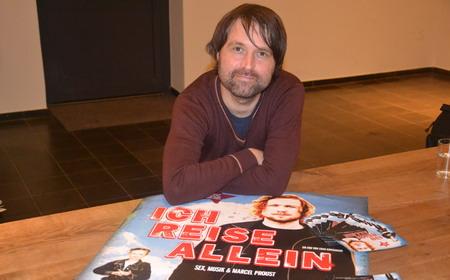
Am Donnerstag, den 29. Dezember – kurz vor Abschluss des Jahres – hatte filmtogo.net die Gelegenheit im Lichtwerk in Bielefeld mit dem norwegischen Filmemacher Stian Kristiansen zu sprechen. Sein Spielfilmdebüt ‚Der Mann, der Yngve liebte‘ kam 2008 aufgrund von musikrechtlichen Gründen nicht in die deutschen Kinos und ist bis heute nur als Import-DVD erhältlich. Mit ‚Ich reise allein‘ hat der Regisseur dazu gelernt und sich die Musikrechte für einen weltweiten Vertrieb gesichert. Eine ausführliche Rezension zum Film könnt ihr hier auf filmtogo.net nachlesen. Hier aber nun das Interview mit Stian Kristiansen über Musik, den französischen Schriftsteller Marcel Proust und den Blasen, in denen jeder von uns lebt.
filmtogo: First of all, what did you have in mind creating the „Humpelfinkel“, the little stuffed animal which Lotte is carrying around all the time?
Stian Kristiansen: The thing was supposed to be a “My Little Pony” or another famous childrens toy, like “Barbie” or something like that. But I didn’t want to have that in the movie, because it was product placement. So I got this idea for the little girl having her own homemade pet toy. I draw just a hand with eyes on it. And then it was made. I gave it the name “Humpelfinkel”.
filmtogo: Your new film is the follow-up to ‘Der Mann, der Yngve liebte’. Why do you choose to do a follow-up, not mentioning it is a follow-up? ‘Ich reise allein’ feels a lot like a stand-alone movie. So why do you went back to the same universe with the same character of Jarle Klepp?
Stian Kristiansen: It is not the same universe. It is a different city. Jarle is ten years older. For me it is like two different movies. They don’t even look the same way. Making the first one was really nice. It was good to work with the script writer and with my producer. It kind of felt okay to do another one. It’s not that you can pick and choose. It is hard to make movies. There are a lot of movies I want to make. I have other projects. But this one got funding. Then I jumped on board and tried to make the movie I like, to give it a personal touch. Of course there are some similarities, but they’re very small. You don’t need to watch the first film. I think it is even better if you haven’t seen the first one. That was a big problem in Norway, because everybody loved the first one. It was a big success and the audience were expecting more or less the same, since it was a follow-up. But it was a different type of movie. There was more of a grown-up attitude in it. The first one was more punk.
filmtogo: You just said it, I felt it as I watched the movie. It is a little bit funnier than the first Jarle-movie. Is this funniness a part of the story, in which you use a stereotypical picture of students?
Stian Kristiansen: It could be. Simultaneously I don’t want to look down on students. I’ve been a student myself. I don’t want to be ironic, I hope I’m not ironic, I don’t mean it ironic. They live in their own little bubble. They’re doing their things. And then there is something knocking on the door to this bubbles and they’re trying to understand the world by reading philosophical works. And it is a problem for Jarle Klepp, when a seven-year old girl that he has never seen or heard of, suddenly turns up being his daughter. All the philosophy that he knows, all what he really wants to do and what he thinks is important, doesn’t really matter in the end. You won’t find the answers in any of these books.
filmtogo: Was there a time when life was knocking on your little bubble? Did something similar happened to you than in the film to Jarle? Something that turns your world upside down from one moment to another?
Stian Kristiansen: Yes, of course. You have break-ups, you have broken hearts, you have career shifts, you have grandparents who pass away. You have all kinds of this reality, that knocks on your door. My little bubble is trying to make movies. I can relate to a lot of the things that happen to Jarle. I understand trying to do your thing. You try to emphasize what you mean and understand from life. But when I make a movie, I’m a total disaster with my family, with my girlfriend, with everything. I would not be around myself if I were them. Maybe that’s a little bit how Jarle Klepp is. When you get a daughter, you change. There are more important things in life than making films, for example. Of course there are. But I doesn’t feel that way when I’m doing them.
filmtogo: How was your own life as a student?
Stian Kristiansen: Partying, Drinking and waking up at places, I really didn’t know. I was walking the walk of shame early in the morning. But for me, most of my student time was at a regional film school. It was more of a factory, where I was making movies. I had a more practical study time.
filmtogo: Another big aspect of the film is the music, which comes from Norwegian bands.
Stian Kristiansen: The first film was more of a music-film. It had The Cure and Joy Division in it. All the bands you love from the 80s. There were R.E.M. and The Pixies. They’re in this film, too. But this time we realized, that we had to clear the musical rights for the entire world. Therefore I stayed away from the obvious soundtrack movie. The first one I made has an own soundtrack – two cds. It’s a lot of music and another reason why people liked the film. But in ‘Ich reise allein’ we used a lot of music by a Swedish punk-rock band called “Bog Hund”. They gave us a really good deal. I could use five songs. I could use whatever I wanted for the entire world.
filmtogo: I didn’t know the song which Jarle and his friends were playing at the birthday party for Lotte. Where does that song come from?
Stian Kristiansen: That’s a very famous Norwegian children’s song. Of course there are some internal jokes in the film, that people do not understand in other countries. The last song in the film is sung in Norwegian by a band called “Kaizer Orchestra”, which I know has been playing a lot in Germany. But they’re singing in Norwegian. What they are singing makes people cry in Norway, but doesn’t have any effect in the German audiences. So you’re losing some of the Norwegian intentions, which you do not understand, if you don’t know the language. There are dubbed versions, but they didn’t dubbed the songs. Just the songs which the actors are singing.
filmtogo: We talked about it before. Jarle Klepp is writing an article about Marcel Proust. How does his works got your attention?
Stian Kristiansen: That’s just a passion of Jarle Klepp. He’s into this Marcel Proust thing. He’s going to write an article for a newspaper in Norway. It’s the cultural and intellectual newspaper in Oslo. So he has this dream of making an article and make a breakthrough to an intellectual environment. It is really silly. I don’t know very much about Proust, neither do the actor. He asked me if he should read this and it’s like 1500 pages. I was like “No, of course not”. He’s a fanatic football fan. He knows a lot about football. So you can relate to something by using other stuff in your imagination. As an actor you still believe it. But the author of the book – Tore Renberg – had to read Marcel Proust. He is very into Marcel Proust. He also writes articles about him. That’s more self-biographical. For me, the story of the little girl was more important or that Jarle Klepp is a student of literature. Marcel Proust is more of a background for me. It is not the most important stuff.
filmtogo: You were just mentioning the little girl. How was it like to work with Amina Eleonora Bergrem?
Stian Kristiansen: I’ve been told you shouldn’t work with animals and kids. And you should not make films in water. Now I’ve done all of that. It was a great experience to work with her. It was one of the main reasons why I wanted to make this movie. It was a big challenge for me as a director. She is one of the main characters in the movie. In 35 days of shooting, she was 29 days there. We had lesser time, because she is a child. She had to go home early, otherwise the police would’ve come and shut us down, because it’s child labor. So we had to work under time pressure. And for me, directing professional actors is one thing, using references from our own lives. But for her I was crawling around on the floor. I was more directing from the stone age. It was really funny. After a while I really thought, that the actors were more a pain in the ass than the little girl. All the actors had difficult questions like “Why do I read Marcel Proust?”. I don’t know. Jesus Christ, why not? Amina asked all the funny questions instead of intellectual questions.
filmtogo: I was surprised about the ending of the film. Why do you choose not to have the typical happy ending like so many other films would’ve done it?
Stian Kristiansen: I don’t know. I’m from Norway. I’m not from Hollywood. So that’s maybe why. I think it’s kind of a happy ending. It is a happy ending. He says that he loves her. He gives her the hug she is waiting for the entire movie. When she’s gone, she’s a part of his life, whether he likes it or not. And then he got his article about Marcel Proust. So in many ways he is on top of his career so far. And then there is Jarle Klepp, sitting in a bus, reflecting over his own life and it feels okay. Life isn’t always easy. But I think, ‘Ich reise allein’ is more true to life than a Hollywood ending would be.
filmtogo: Do you have any new projects after ‘Ich reise allein’?
Stian Kristiansen: Yes. For me this movie is one year old. It was just released in Germany, but in Norway it was released in February. I’ve been working on another project since. It is a new feature film. The English title will be ‘Kiss me, you fucking moron’. It is about a 17-year old girl. It’s more of a coming-of-age story, which is set more to nowadays.
Der Regisseur war wirklich ein netter Interviewpartner. Es ist ihm jedenfalls hoch anzurechnen sich zwischen Weihnachten und Neujahr noch auf eine solche Kinotour zu begeben. Am selben Abend wurde er noch in ein Kino nach Münster verschafft um anschließend nach Düsseldorf zu fahren. Insofern vielen Dank an Stian Kristiansen, dass er sich die Zeit für das Interview genommen hat. Vielen Dank auch an Neue Visionen und Jürgen Hillmer vom Lichtwerk Bielefeld, die dieses Interview möglich gemacht haben. Hier noch einmal der Hinweis: Eine ausführliche Rezension zu Stian Kristiansens ‚Ich reise allein‘ findet ihr hier auf filmtogo.net. Der Film läuft seit dem 29. Dezember 2011 in den deutschen Kinos.


